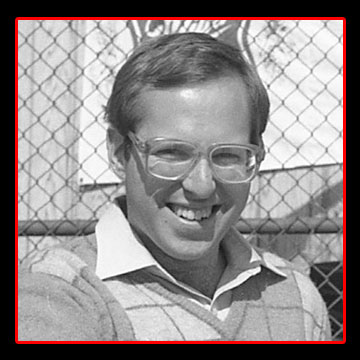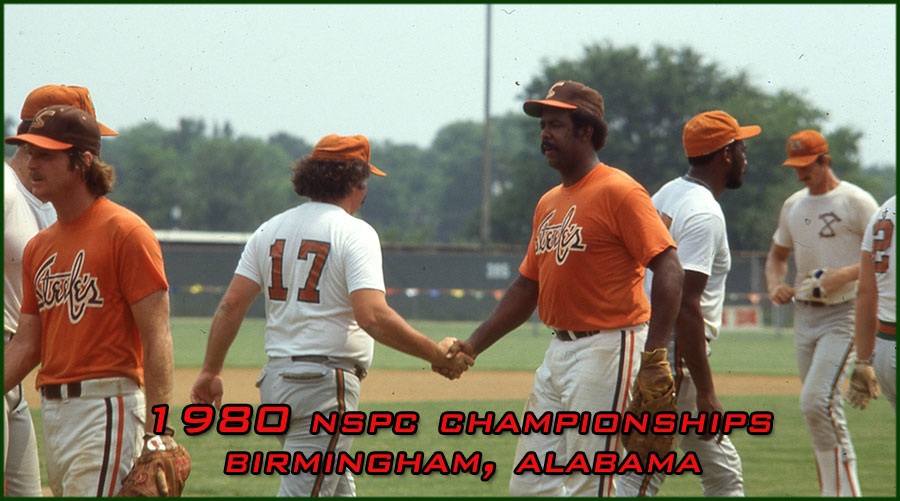I have always loved the fact that I was able to play ball with all of the players and people I have met over the years...I was blessed to be able to play against some phenominal athletes...With the help of a number of people I have tried to put information in my web site that will hopefully help you get a good idea what slow pitch softball was in the early parts of the sports history..
I have put some information and photos on a number of the softball teams that played in the 1970's, 1980, and 1990's. My good friend Robert Brown helped me also. Robert is an exceptional person to get info from, about the older days/early years of sl;owpitch softball.....
|
November 21, 2021
Robert Brown's remarks:
Until 1973, top level men's slo-pitch softball was almost exclusively made up of teams whose rosters were comprised of players within each local area. From the first ASA slo-pitch champions in the mid-1950's through the 60's and early 70's, teams made up of players from Cincinnati, Northern Kentucky, Pittsburgh, Detroit, Milwaukee and Long Island sponsored by smaller retail businesses battled it out for the Labor Day title. Teams pretty much played during the week in local leagues and drove to a half dozen out of town tournaments from May to August.
In 1971, Virginia Piledrivers won the championship in Cleveland after helping all-time great Bert Smith move from Long Island where he played with County Sports to Virginia. Several other players from the Maryland-Northern Virginia area also played on that team but other than Bert, it was a regional team. In 1973, Richard Howard became the first national sponsor to bring in multiple players from out-of state, those being Bert Smith, Stan Harvey, David Carroll and HT Waller. It paid off with Howard's winning back-to-back championships in 1973 and 1974. Jerry's Catering out of Miami finished second in 1974 and brought in Al White but most of the team was from Florida. The USSSA at that point also had local teams as champions with Bay Area Merchants, Dino's and Snyder's in 1973-75.
1975 was the year that the ASA instituted a residency rule and the competition was very even with any one of 20 teams having a great chance to win championships. It turned out that 2 totally homegrown teams, Pyramid Cafe from Cleveland and Snyder's from Detroit won the ASA and USSSA championships respectively
|

|
|
|
|
|
|
Nelson's Paint began some national recruiting in 1975 as did Warren Motors in 1976 although both teams had a majority of players from Oklahoma and Florida in those years. Also, in 1976, Taylor Brothers recruited Rick Scherr from Milwaukee and the 1976 USSSA World Series featured Little Caesar's picking up Bert Smith, Stan Harvey and Denny Hogan from Howard's and Snyder's picking up Phil Higgins from Milwaukee and Braxton Speller from North Carolina. Braxton moved full-time to Detroit to work in the auto industry where he joined Chuck Drewicz who had moved from Milwaukee to Detroit earlier that year.
It was 1977 when the wholesale movement of players and significant costs began. With the advent of the professional league, players were paid to play and Bert Smith, Ronnie Ford, Mike Nye and Jack Roudebush were brought to Detroit to play for Detroit Caesars. Nelson's recruited extensively, bringing in Bruce Meade, Herman Rathman, Joe Young and Al White and Crusher moved to North Carolina to play for Howard's. By 1978, Campbell's recruited players from coast-to-coast and it became apparent that to win championships, a sponsor would have to provide significant resources to compete for a championship.
Nelson's, Campbell's and Howard's won the Triple Crown 1979-81 with rosters comprised of players from around the United States. Jerry's won the USSSA in 1982 and 1983 with a similar roster and then Steele's, Elite, Smythe Sox and Ritch's Superior followed suit during the remainder of the 1980's and 1990's. Major Mens Softball had become an expensive proposition that required partnerships with equipment manufacturers to offset certain costs.
|
Robert Brown's Bio
|
Robert Brown became involved while in high school with men's softball in 1971, joining Mertz Bake Shop from Oak Park, Michigan in the Detroit area as statistician-coach. At that time, Detroit was a hotbed for softball with defending ASA Champion Little Caesar's, Snyder's, Dino's Pizza, Daly's Drive-In and other teams that appeared in national tournaments on a regular basis. The following year, 1972, Mertz was a charter member of the Detroit Major Metro Travel League and finished 4th in the USSSA Eastern World in Petersburg, Va. Robert later joined Stroh's, Bert's Blackhorse which finished 2nd to County Sports in the 1975 Stroh's Invitational in Springfield, Ohio and Uniroyal which finished 5th in the 1976 USSSA World Series in Wyandotte, Michigan.

In 1977, after graduating University of Michigan where he was a student manager for the football and hockey teams, Robert joined Detroit Caesars of the American Professional Slo-Pitch League and became Assistant General Manager as well as administrator for the League Office in 1978. In 1979, Robert became Vice President of Marketing for the League and was responsible for procuring a contract with ESPN which televised the Pro World Series between Milwaukee and Kentucky as their first live network event.
Robert became Commissioner of the professional North American Softball League in 1980 and Executive Director of the National Slo-Pitch Conference in 1981. In 1982, he became General Manager of the Detroit Softball City Pro Team which lost to Milwaukee in the World Series. That turned out to be the last year of pro softball and the NSPC and Robert became Michigan USSSA Director 1982-83. He left softball to become General Manager of the Detroit Express Professional Soccer Team and attend law school. Robert was inducted into the Michigan USSSA Hall of Fame in 1990. Robert Brown is one of Slo-Pitch Softballs true ambassadors for the game we all love so much! |
Big Cat's Remarks
If a big time sponsor had a plan then so be it. I do know one of the reasons softball is where it is today is because of sponsors like the ones back in the day. The 70's, 80's, and the 90's. Those sponsors and players paved the way for what you have today. If you think differently then you are kidding yourselves. Players like Mike Nye, Ronnie Ford, Ray Fleetwood, Bruce Meade helped establish Big Time softball. Players like Don Arndt and Stan Harvey played for the love of the game and it did not really matter how much they got paid. Don Arndt worked at the furniture store and Stan Harvey worked for the Tennessee Power Line.
If you were involved with Big Time Softball you spent 100,000.00 a year just on salaries. You played in 15 tourneys a year and flew your players in. There was no bat sponsors or personal bat contracts. We created the personal bat contracts at Steele's. Campbell's plan worked for himself. He was involved in the 70's right up until the 80's. His team won the Triple Crown in 1980 and he folded his team after that. The Texas Connection then went to Howard's, Cellura, Myers, Ferguson, Wilborn and then throw in Buddy Slater to do the pitching. Randy Gorrell was manager of Campbell's and then he managed Howard's to the triple crown.
Pretty good stats right there for one person. 2 Triple Crown's in a row. A team called American Realty was on the way up from California but then the NSPC folded. American Realty was coached by Danny Brown. You have to remember that teams back then had to come out of a region. Your players had to live in that region. How do you think Mighty Joe Young, Don Clatterbaugh, and Chic Downing played for Steele's. They moved them to Lima, Ohio to play ball for Steele's. . Furhman moved to Miami to play with Jerry's.

|
|
|